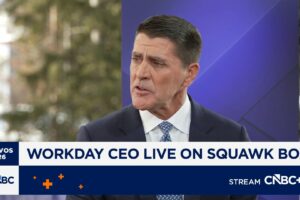
(Bloomberg) — Peloton Interactive Inc. co-founder John Foley, who stepped down from the chief executive officer role last month, sold about $50 million in stock to MSD Partners, a firm that manages money for billionaire Michael Dell.
Most Read from Bloomberg
The sale involved 1.92 million shares, according to a regulatory filing Wednesday. MSD Partners is run by Goldman Sachs Group Inc. veteran Gregg Lemkau and oversees assets of more than $20 billion, including for Dell and outside investors.
“This decision to exercise some stock options and sell those underlying shares in a private sale to MSD Partners was John’s decision, based on his own financial planning,” Peloton said in a statement. Foley remains an employee and executive chairman of Peloton despite handing over the CEO role to former Spotify Technology SA and Netflix Inc. executive Barry McCarthy.
Lemkau said in a statement that Peloton “is an exceptional brand and MSD Partners is pleased to have this opportunity to back Barry McCarthy and the Peloton team as they position the business for long-term growth.”
Prior to McCarthy’s appointment as CEO, there was speculation that Peloton was looking to sell itself and that deep-pocketed companies such as Nike Inc. and Amazon.com Inc. were considering making bids. But the new leader has stressed that he’s focused on turning around the business.
MSD Partners is buying Peloton shares after they lost three-quarters of their value over the past year. Now at about $26, Peloton peaked at around $170 per share last January at the height of the Covid-19 pandemic.
The company’s exercise bikes were a hot commodity when consumers were hunkering down at home and avoiding in-person gyms. But in 2021, as vaccines emerged more broadly and lockdowns eased, sales of Peloton’s hardware and services slowed.
The company also struggled to match supply with demand — both during boom times and the subsequent slowdown — shaking investors’ confidence. After the share price crumbled, Foley resigned as CEO in February and the company brought on McCarthy. Longtime executive William Lynch stepped down as president and many other top managers departed the company. Peloton also announced plans to lay off 20% of its staff.
As part of the overhaul, Peloton reevaluated its operating strategy and nixed plans for an in-house manufacturing facility in Ohio, which would have created many new jobs in the region.
A recall of the company’s treadmills also hurt the brand. Last year, a baby died in an accident with the company’s highest-end product, a treadmill that costs almost $5,000. The company initially rejected criticism of its product’s design before later recalling it. It remains off the market.
Peloton’s image suffered onscreen as well. In a scene in the new “Sex and the City” series, a central character died from a heart attack after riding a Peloton bike. A character in the show “Billions” also suffered a heart attack after using one of the company’s bikes, though he survived.
Since taking the helm, McCarthy has pledged to fix the company with a sharper focus on subscriptions and new pricing strategies. He’s also said Peloton is revamping its supply chain approach and will look to avoid a repeat of the company’s operational struggles.
Still, Peloton needs new hardware products to remain competitive. It plans to launch the new Guide strength-training device in April following a brief delay. It’s also working on a rowing machine and a secondary strength training device.
(Updates with share decline and other background starting in sixth paragraph.)
Most Read from Bloomberg Businessweek
©2022 Bloomberg L.P.












